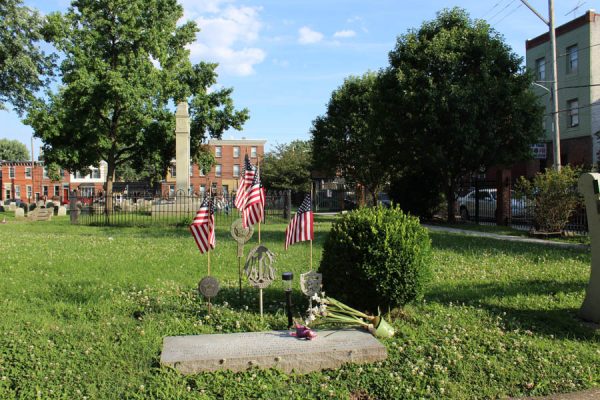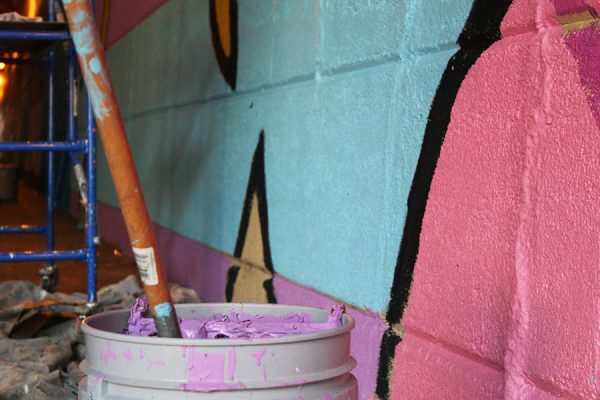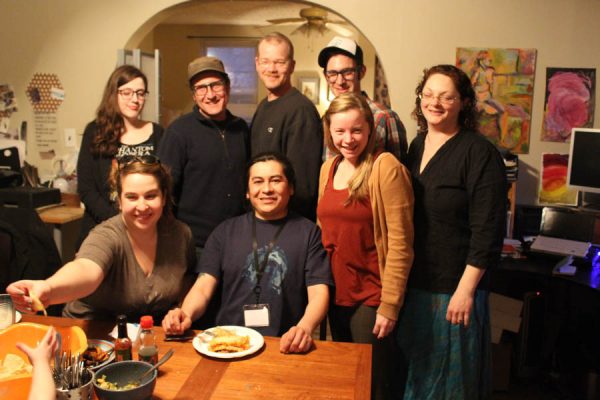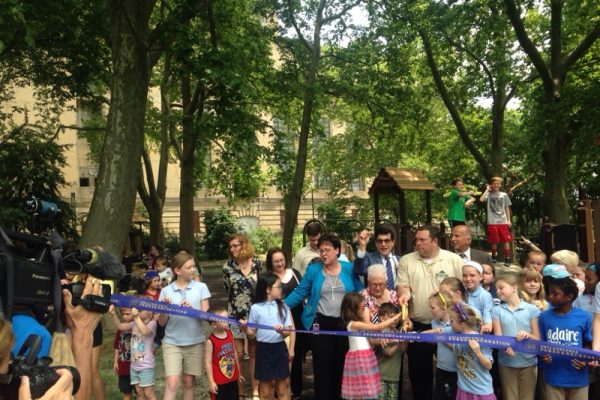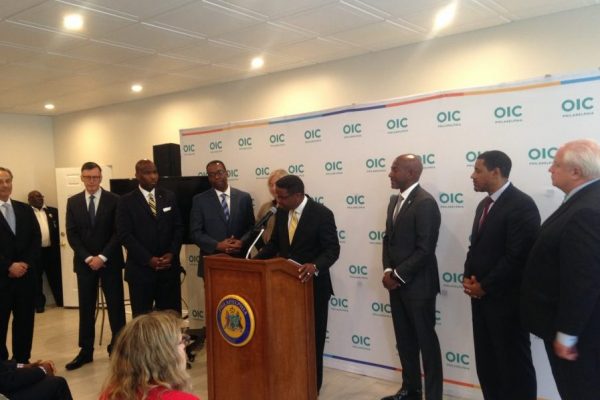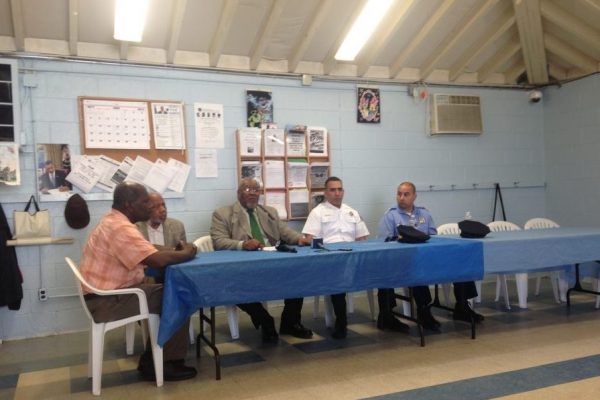Remembering George Benton, North Philadelphia Boxing Great
With the passing of the “Greatest of All Time,” the world has reminisced on some of boxing’s most memorable moments. Here in Philadelphia, one man became a local phenomenon by beating almost every opponent he ever faced. After his career as a boxer subsided, he trained the men who dared to take the title away from the great Muhammad Ali.
Standing at 1314 N. Broad Street is a relic of Philadelphia boxing history, the Blue Horizon Boxing Arena. The building was originally built in 1865 as a “ritzy residential property” before being converted to a Moose Lodge in 1912. Jimmy Toppi Jr. began promoting fights at the venue called Toppi’s Auditorium. Renamed after the song “Beyond the Blue Horizon,” this local boxing ring entertained 1,300 fans per fight and Philadelphia’s finest boxers would become legendary to those attendees.
One particular North Philly boxer competed at this site 14 times and never lost. George Benton had his first professional fight on July 18th, 1949 at Toppi Stadium. Benton’s second-to-last professional fight (last win of his career) came at Blue Horizon on March 25th, 1970. Benton enjoyed another victory there just 71 days earlier when he knocked his opponent out in the first round. For Benton’s final two fights at Blue Horizon, he earned $7,444, which is the equivalent to $45,903.58 in 2016.
George Benton was born and raised in Philadelphia, living at several locations including: 19th, 29th, Harrison, Logan, and Walnut Streets (and others). George was born on May 15th, 1933. As one of eleven children in his family, he developed a good work ethic and close relationships with his family. His father always told him, “No matter what you do, don’t be a thief or a crook. Find a job and stick with it.” Benton’s upbringing is what contributes to his comment in a 1992 Sports Illustrated interview, “Athletes today are spoiled.”
 Benton had his first amateur fight at the age of 13 and he became a professional fighter at the age of 16 in 1949 when he knocked out Chico Wade in the first round. 21 days later, Benton would defeat Whitman Dorsch in four rounds. His first two fights both took place at Toppi’s Stadium. Benton won his first seven fights as a pro, his seventh fight being a victory in Connecticut on his 17th birthday. After his first loss, he enjoyed 17 consecutive victories, the longest undefeated stretch of his career.
Benton had his first amateur fight at the age of 13 and he became a professional fighter at the age of 16 in 1949 when he knocked out Chico Wade in the first round. 21 days later, Benton would defeat Whitman Dorsch in four rounds. His first two fights both took place at Toppi’s Stadium. Benton won his first seven fights as a pro, his seventh fight being a victory in Connecticut on his 17th birthday. After his first loss, he enjoyed 17 consecutive victories, the longest undefeated stretch of his career.
George Benton had a professional record of 62-13-1 with 37 knockouts when he retired. He was never knocked down in his 21-year career, and he was only stopped in a fight twice, “once from a cut, once from exhaustion [at the end of his career].” He is considered the greatest middleweight fighter who never won a world title. In fact, he never even got the chance to fight for the world title, despite being ranked number one in his weight class.
Benton defeated future-champion Joey Giardello in Philadelphia on August 6th, 1962. The winner of the fight was supposed to fight the current champion for the world title. Reigning Middleweight World Champ Dick Tiger instead fought the loser of the Benton-Giardello match, and Benton was unable to compete for the title. Lou Duva, Joey Giardello’s manager, told Sports Illustrated three decades later, “Yeah, I screwed George out of his shot. He didn’t even know about it until I told him many years later.” Benton never had the opportunity to fight for the title, but he did win the Pennsylvania State Middleweight Title in 1964.
 There are many reasons why George Benton never had the chance to fight for the title, mainly because his manager, Herman Diamond, refused to work with mafia bosses, which was very important for booking championship fights, regardless of how good the boxer was. And Benton was good.
There are many reasons why George Benton never had the chance to fight for the title, mainly because his manager, Herman Diamond, refused to work with mafia bosses, which was very important for booking championship fights, regardless of how good the boxer was. And Benton was good.
49 percent of his fights resulted in knockout victories. Standing at 5’10”, George fought in the middleweight class with an orthodox stance. Benton was known as “The Mayor,” “The Master,” and “The Professor.” Benton defeated three future champions: Joey Giardello, Freddie Little, and Jimmy Ellis. Still, Benton was given no shot at the title. In addition to mafia connections, boxers also had to look a certain way if they were going to get a chance to be the best. “Nobody would fight him” because of how good he was and because he was black. In Benton’s 76 fights, he only had white opponents twice. Philadelphia legend Russell Peltz said George Benton “was one of the top ten fighters to come out of Philadelphia.”
Benton was lucky enough to box professionally in four different decades. The “title changed hands 22 times during Benton’s 21-year career and he never got a shot.” His career, though already dwindling, was abruptly ended in 1970 when he was shot by a man that he did not know. But in typical “George Benton” fashion, he did not go down without a fight.
A man known around North Philadelphia as “Chinaman” was trying to pickup one of the Benton sisters at a bar. One of the Benton brothers decided to rough him up for disrespecting his sister. Chinaman “vowed to kill a Benton as revenge.” Chinaman followed George Benton to work. The boxer’s life was saved because he heard Chinaman when he pulled out his gun. George turned his body just before the trigger was pulled, and the bullet narrowly missed his spine by about two inches. With lead lodged in his body, George continued spinning around until he was face-to-face with his attempted-assassin. George grabbed Chinaman and slammed him against a nearby brick wall and “bludgeoned him with his head until [he] dropped the gun.”
 Benton’s friends took care of Chinaman “North Philly style” to avenge the boxer while he was in the hospital. Benton lost significant weight while hospitalized on-and-off for the next two years. Because the bullet was so close to the spine, it stayed inside of his body for the rest of his life. Benton’s career was over, his money was gone and his health was fragile. Benton never knew who Chinaman was, and Benton had not even heard of the incident at the bar involving his sister until after he was hospitalized.
Benton’s friends took care of Chinaman “North Philly style” to avenge the boxer while he was in the hospital. Benton lost significant weight while hospitalized on-and-off for the next two years. Because the bullet was so close to the spine, it stayed inside of his body for the rest of his life. Benton’s career was over, his money was gone and his health was fragile. Benton never knew who Chinaman was, and Benton had not even heard of the incident at the bar involving his sister until after he was hospitalized.
Making ends meet, Benton worked tending bars around the neighborhood. One day, Lou Duva (the manager who screwed him over) approached Benton with an offer. He wanted the retired boxer to teach his fighters how to defend themselves since Benton was known as a “defensive ring wizard” who invented the shoulder roll. Today, comparisons are made between George Benton and Floyd Mayweather in regard to their defensive abilities. Benton’s decision to become a trainer made him a millionaire.
Benton trained alongside Eddie Futch at Champs Gym at 33rd and Dauphin. Benton “was in Joe Frazier’s corner for the Thrilla in Manila in 1975,” considered the greatest boxing match in the history of the sport. Although Frazier lost to Muhammad Ali, Benton devised the strategy that Leon Spinks used to defeat Ali for the Heavyweight Championship on February 15th, 1978. Benton also trained Evander Holyfield to his Heavyweight Championship in 1990. His imposed his defensive strategies onto the greatest boxers of all time and they were effective in beating Ali: the greatest boxer of all time.
 In 1986, George Benton was inducted into the Pennsylvania Boxing Hall of Fame. Benton received the “Trainer of the Year” award in 1989 and 1990. Benton was inducted as a trainer into the International Boxing Hall of Fame in 2001 and the World Boxing Hall of Fame in 2007.
In 1986, George Benton was inducted into the Pennsylvania Boxing Hall of Fame. Benton received the “Trainer of the Year” award in 1989 and 1990. Benton was inducted as a trainer into the International Boxing Hall of Fame in 2001 and the World Boxing Hall of Fame in 2007.
Of the 19 boxers that George Benton trained, 12 fighters won more than 25 titles in 10 different weight classes, as well as winning 5 Olympic medals, and another three fighters participated in title fights at least once in their career. Only 2 of the 19 boxers Benton trained did not fight for a title or win an Olympic medal. His distinguished career immortalized him in three Boxing Hall of Fames, and his “scientific approach” to boxing continues to impact the sport today.
George Benton died in the hospital due to complications with pneumonia on September 19th, 2011 at the age of 78. His services were held at Christ-like Pleasant Green Faith Baptist Church on 25th Street. Leaving behind a wife and six sons, George Benton is buried in Washington Crossing National Cemetery in Bucks County. Although less memorable than Muhammad Ali, George Benton’s legacy is still strong to true boxing fans and Philadelphians should be prideful in his abilities as a fighter and a trainer.
Information for this article was taken from: Baltimoresun.com, Beatsboxingmayhem.com, Boxing.com, Boxinginsider.com, Boxingletstalk.com, Boxingnews24.com, Boxingscene.com, Boxrec.com, Cyberboxingzone.com, Doghouseboxing.com, Espn.com, Fightnews.com, Findagrave.com, Highbeam.com, Ibhof.com, Imdb.com, Joefrazierfilm.com, Maxboxing.com, Nj.com, Nobsboxing.com, Nydailynews.com, Nytimes.com, Pabulletin.com, Peltzboxing.com, Philadelphiadailynews.com, Philly.com, Phillyboxinghistory.com, Phillytrib.com, Preservationalliance.com, Ringsidereport.com, Ringtv.craveonline.com, Scoopusanewspaper.com, Sherdog.com, Si.com, Theboxingtribune.com, and Thesweetscience.com.



